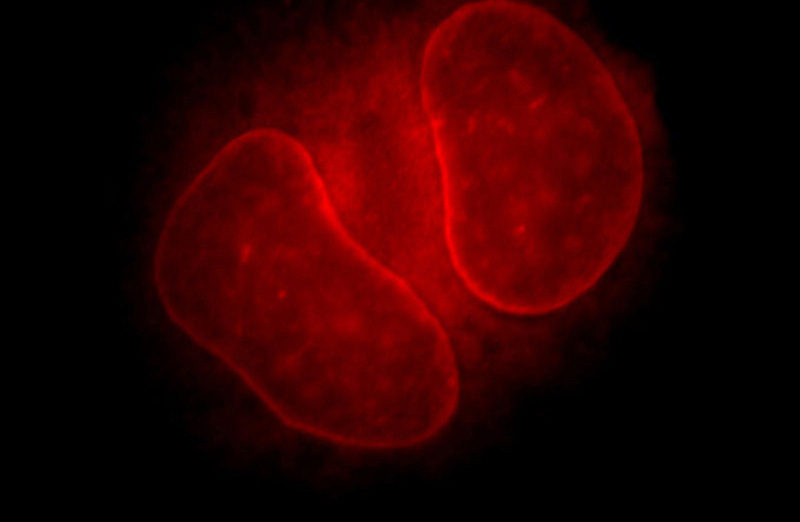-
Product Name
THAP2 antibody
- Documents
-
Description
THAP2 Rabbit Polyclonal antibody. Positive IF detected in Hela cells, HepG2 cells. Positive WB detected in HEK-293 cells, HeLa cells, human brain tissue, mouse testis tissue. Observed molecular weight by Western-blot: 26-30kd
-
Tested applications
ELISA, WB, IF
-
Species reactivity
Human,Mouse,Rat; other species not tested.
-
Alternative names
DKFZp564I0422 antibody; THAP2 antibody
-
Isotype
Rabbit IgG
-
Preparation
This antibody was obtained by immunization of THAP2 recombinant protein (Accession Number: NM_031435). Purification method: Antigen affinity purified.
-
Clonality
Polyclonal
-
Formulation
PBS with 0.02% sodium azide and 50% glycerol pH 7.3.
-
Storage instructions
Store at -20℃. DO NOT ALIQUOT
-
Applications
Recommended Dilution:
WB: 1:200-1:2000
IF: 1:10-1:100
-
Validations

HEK-293 cells were subjected to SDS PAGE followed by western blot with Catalog No:116040(THAP2 antibody) at dilution of 1:600

Immunofluorescent analysis of Hela cells, using THAP2 antibody Catalog No:116040 at 1:25 dilution and Rhodamine-labeled goat anti-rabbit IgG (red).
-
Background
THAP2, also named as THAP domain-containing protein 2, is a 228 amino acid protein, which contains one THAP-type zinc finger. Members of the THAP (thanatos-associated protein) family of proteins contain a well conserved DNA-binding domain known as the THAP-type zinc finger motif. Proteins containing the THAP-type zinc finger motif are commonly involved in transcriptional regulation, cell-cycle control, apoptosis and chromatin modification
-
References
- Leite KR, Morais DR, Reis ST. MicroRNA 100: a context dependent miRNA in prostate cancer. Clinics (São Paulo, Brazil). 68(6):797-802. 2013.
- Morais DR, Reis ST, Viana N. The involvement of miR-100 in bladder urothelial carcinogenesis changing the expression levels of mRNA and proteins of genes related to cell proliferation, survival, apoptosis and chromosomal stability. Cancer cell international. 14(1):119. 2014.
Related Products / Services
Please note: All products are "FOR RESEARCH USE ONLY AND ARE NOT INTENDED FOR DIAGNOSTIC OR THERAPEUTIC USE"
